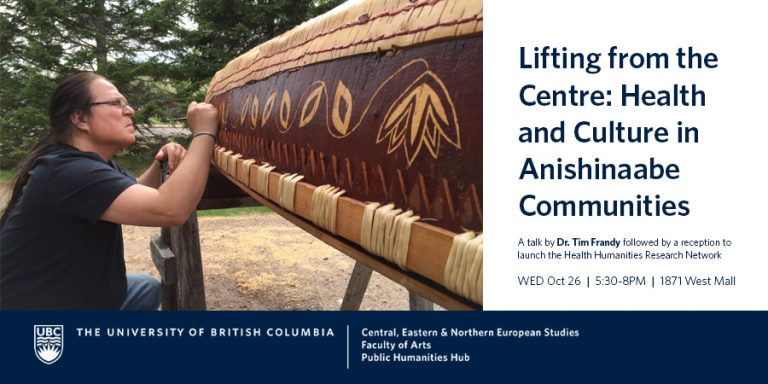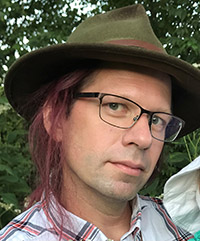
Please join us for an event to welcome Assistant Professor of Nordic Studies Dr. Tim Frandy to UBC. Explore a series of culturally-situated health programs in Waaswaaganing with Dr. Frandy. These projects help illustrate the value and necessity of humanists working in public health today. Following their talk, enjoy a reception to launch the Public Humanities Hub’s new Health Humanities Research Network. Please join the Research Network to meet Health Humanities colleagues, participate in upcoming events, and receive updates about HH scholarship and opportunities.
Abstract: Health and health care are concepts rooted equally in culture as they are in science, from understanding fundamental states of wellness and illness, to understanding the cultural logics that inform a course of treatment. Many Indigenous communities today possess an ambivalent relationship with Western medicine, which despite its successes has a deep history of racism—whether pathologizing Indigenous knowledges and cultural practices, or supporting eugenics-based practices like forced sterilization in the 1970s. The legacy of ethnocentrism today endures in health care, in notions of diet and exercise, in communication patterns and power dynamics in the clinic, and in understanding healthful living in everyday life. Ultimately, the settler vision of Indigenous health too often leads to eating more like a settler, to exercising more like a settler, to being more like a settler, thereby creating public health structures that quietly work as agents of cultural assimilation.
This presentation explores a series of culturally-situated health programs in Waaswaaganing (Lac du Flambeau, Wisconsin) that I assisted in developing in tandem with culture keepers in the community. These programs are developed in ways that take strengthen the culture rather than erode it, reinforcing not only cultural practices but also Anishinaabe ontologies and epistemologies. From birchbark canoe building to Anishinaabe sports, from ricing camps to the construction of traditional housing, these projects help illustrate the value and necessity of humanists working in public health today.
 Part of the Sámi American community, Tim Frandy is an Assistant Professor of Nordic Studies in the Department of Central, Eastern and Northern European Studies at the University of British Columbia. Frandy’s research involves decolonization, the environmental and medical humanities, and folklore studies.
Part of the Sámi American community, Tim Frandy is an Assistant Professor of Nordic Studies in the Department of Central, Eastern and Northern European Studies at the University of British Columbia. Frandy’s research involves decolonization, the environmental and medical humanities, and folklore studies.
Wednesday, October 26, 2022
5:30 – 8PM
Asian Centre Auditorium
1871 West Mall, Vancouver BC V6T 1Z2
FREE
Parking: Fraser River Parkade and Rose Garden Parkade
Accessibility: The closest accessible parking is the Fraser River Parkade. Enter Asian Centre on the east side of the building near Memorial Road. This entrance is accessible with a power door. Inside, there is a ramp to the lobby, which leads to the auditorium entrance. There is an accessible washroom in the lobby.
Hosted by the Department of Central, Eastern & Northern European Studies. Co-sponsored by the Public Humanities Hub and the Faculty of Arts.